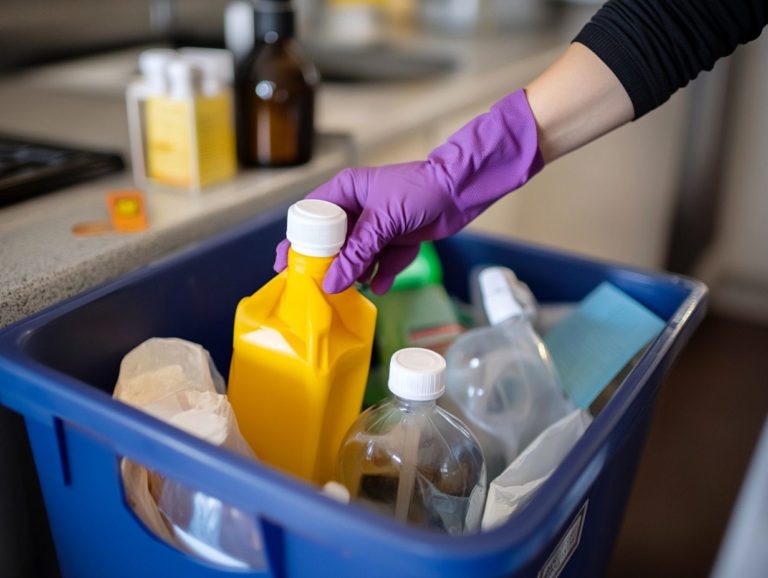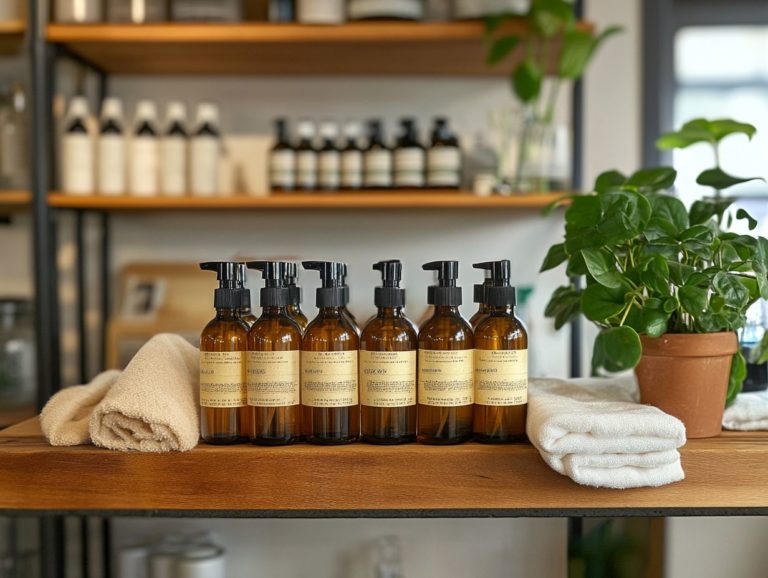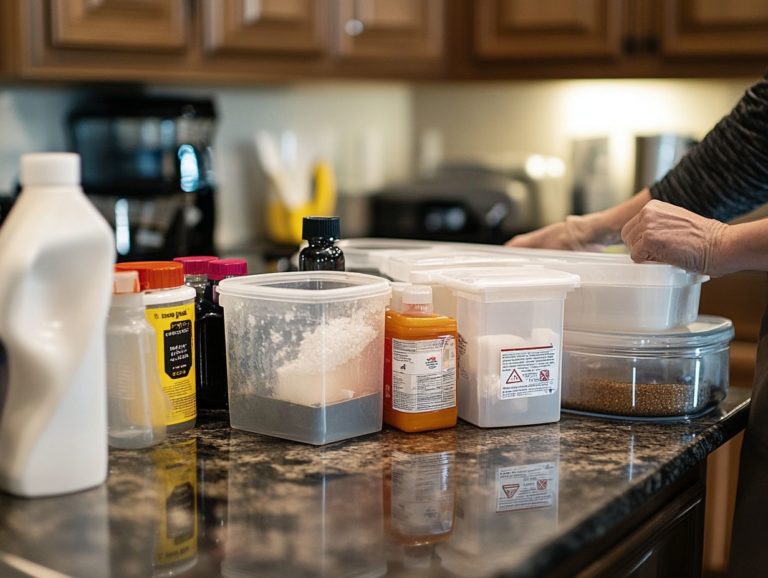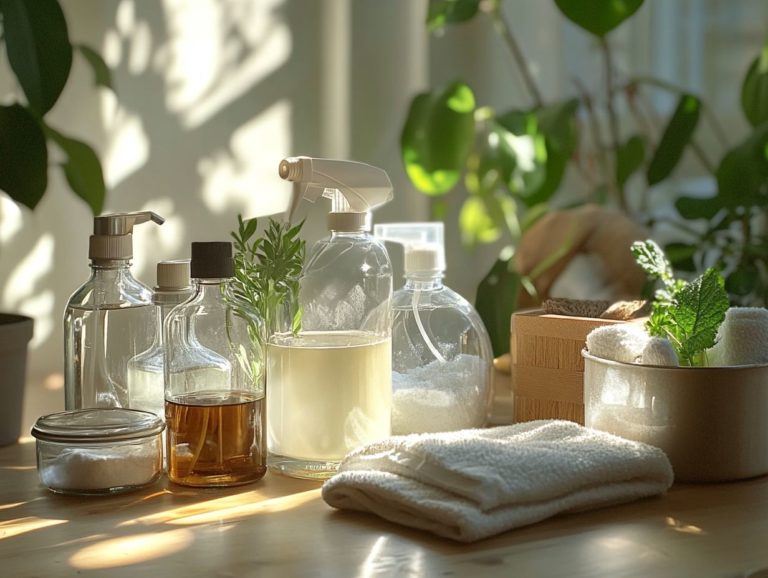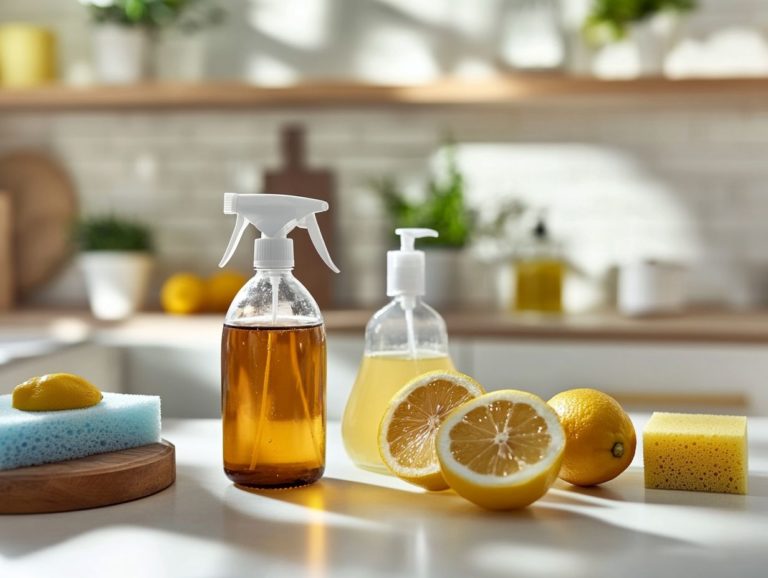Are Homemade Cleaners Cost-Effective?
In recent years, you’ve likely seen a surge in popularity for homemade cleaners as more people seek sustainable alternatives to commercial cleaning products. These DIY solutions not only provide a cost-effective way to keep your home spotless but also offer a safer, non-toxic option for families and pets. Homemade cleaning products, such as multipurpose cleaners and glass cleaners, are gaining traction due to their simplicity and effectiveness.
This article delves into the benefits of homemade cleaners, highlighting their versatility and positive environmental impact. You ll find simple recipes, essential safety tips, and a cost comparison with store-bought options, all designed to help you determine whether homemade cleaners are the ideal choice for your household.
Contents
Key Takeaways:
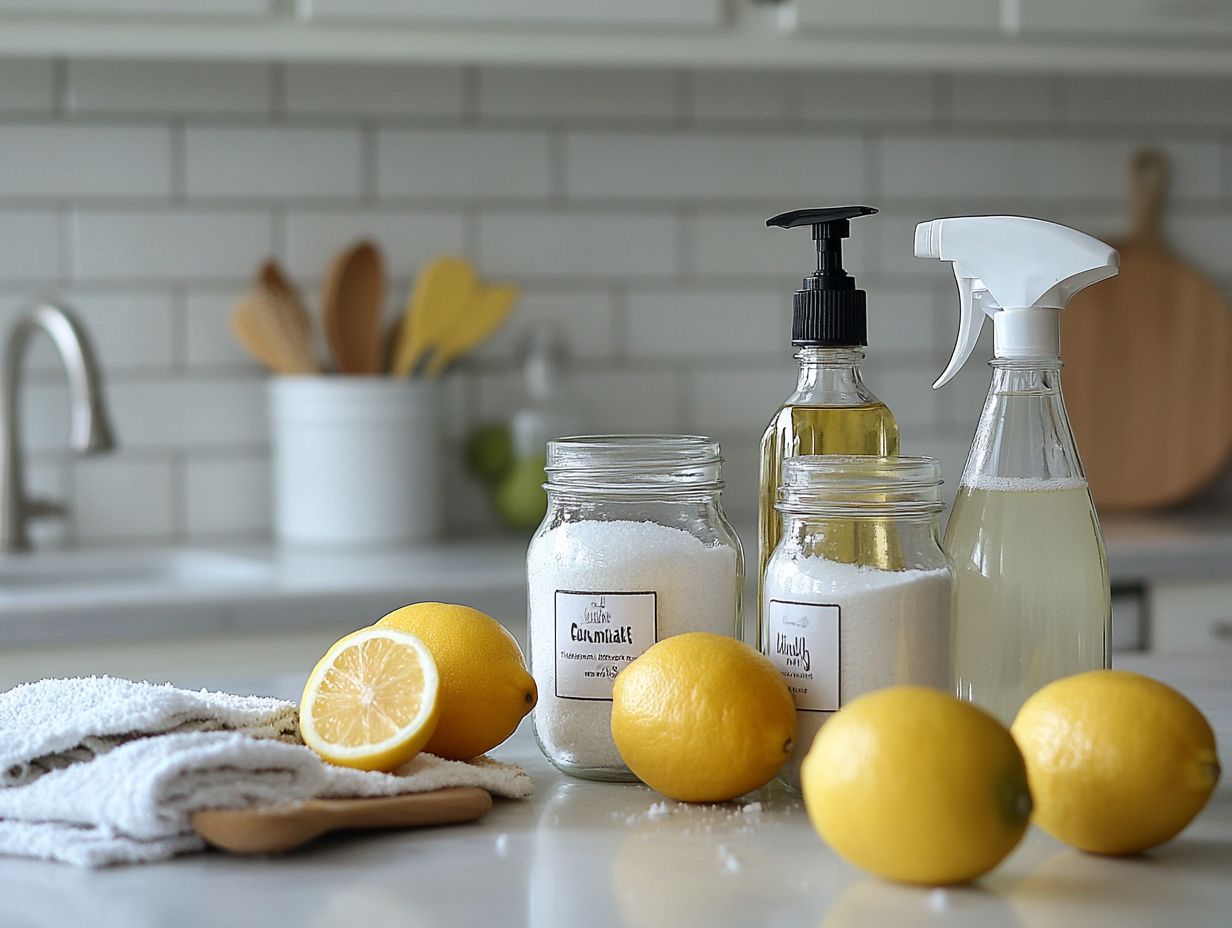
- Homemade cleaners are a budget-friendly option for cleaning, making them a cost-effective choice for those on a tight budget or looking to save money in the long run.
- Not only are homemade cleaners better for the environment, but they also eliminate the use of harsh chemicals in your home, making them a safer, non-toxic option for cleaning.
- With a few basic ingredients and simple recipes, homemade cleaners are versatile and can be customized for a variety of surfaces and cleaning needs, including stubborn stains and delicate fabrics like carpets.
What Are Homemade Cleaners?
Homemade cleaners are your go-to cleaning solutions crafted from the natural ingredients you likely already have around the house, such as baking soda, white vinegar, and essential oils. These natural options are effective and easy on the wallet, making them an appealing choice for anyone looking to lessen their carbon footprint and move away from chemical-laden commercial cleaners.
By harnessing simple household ingredients, you can whip up a variety of cleaning products tailored to your specific needs, including multipurpose cleaners, glass cleaners, and stain removers.
These homemade concoctions can take on different forms sprays, scrubs, or solutions based on their intended use. For instance, adding a bit of castile soap, made from vegetable oils, can enhance the cleaning power of your DIY solutions.
You can also make a gentle scrubbing paste by blending baking soda with a splash of water, perfect for tackling those stubborn stains on countertops or appliances.
And let’s not forget the magic of essential oils, like tea tree, lavender, or peppermint. Adding a few drops not only enhances antibacterial properties but also infuses your cleaning routine with delightful fragrances, turning the chore into a more enjoyable experience. Essential oils also serve as natural cleaning agents, making them a staple in many DIY cleaning recipes.
Discover how easy it is to make a safe and effective cleaner today!
Why Are Homemade Cleaners Popular?
The rise in popularity of homemade cleaners reflects your growing priority for eco-friendly products and health benefits over synthetic alternatives. You strive to create a safe environment for your family. Homemade cleaning solutions, including DIY sprays and stain removers, provide effective alternatives to traditional cleaners.
With increased awareness of the harmful effects associated with conventional cleaning products, many have embraced natural cleaning solutions crafted from simple ingredients like baking soda, white vinegar, and essential oils. This trend champions sustainability. It also gives you the power to take charge of your cleaning routine, allowing you to create cost-effective and non-toxic cleaners right in your own home.
Recent studies reveal that nearly 70% of consumers share your concern about the environmental impact of their purchases, prompting a shift toward more sustainable practices. According to Amy Fort of the Good Housekeeping Institute, homemade cleaning solutions often outperform commercial products in terms of safety and environmental impact.
Research indicates that homemade cleaners can be just as effective, if not more so, than their commercial counterparts. For example, a study published in the Journal of Cleaner Production found that vinegar and baking soda can eliminate 99% of harmful bacteria from surfaces.
By opting for natural alternatives, you, like countless others, are making significant strides toward reducing your carbon footprint while ensuring a healthier living space for your loved ones. This trend is also reflected in the increasing popularity of natural ingredients on platforms like Amazon, where customers frequently search for eco-friendly cleaning products.
Benefits of Homemade Cleaners
Homemade cleaners present you with a wealth of benefits, making them an attractive option if you’re on the lookout for effective, budget-friendly, and eco-conscious alternatives to commercial cleaning products.
One of the standout advantages is their affordability. You can create these cleaners using everyday ingredients like baking soda, white vinegar, and water. This means you can say goodbye to pricey store-bought options.
Homemade cleaners offer a high level of customization and versatility that s hard to beat. You have the freedom to tweak recipes with essential oils or specific ingredients tailored to different cleaning tasks. This enhances your cleaning arsenal while keeping harmful chemicals at bay.
1. Cost-Effective
One of the most significant perks of whipping up your own homemade cleaners is the cost-effectiveness that comes with it. You harness the power of common household ingredients like baking soda, white vinegar, and water items that are often far more budget-friendly than commercial cleaning products.
By crafting your own cleaning solutions, you not only save money but also cut down on the waste generated from packaged goods. A multipurpose cleaner is a solution that can be used on various surfaces. You can create one at home for a mere fraction of the price of a brand-name equivalent. This smart choice leads to significant savings over time!
Consider this: a gallon of white vinegar usually sets you back about $3, and when you dilute it with water, you have a powerhouse cleaner for various surfaces without the harsh chemicals found in many store-bought options. Adding a few drops of essential oils like rosemary can help mask the vinegar smell while enhancing its cleaning power.
Similarly, a box of baking soda, priced at just a dollar, serves multiple purposes, acting as both a deodorizer and a gentle abrasive.
By opting for homemade cleaners, you re not just economizing; you re embarking on a journey to smarter spending habits! Over time, swapping out pricey branded products for these inexpensive yet effective alternatives can lead to significant savings, making your household finances easier to manage while ensuring your living space remains clean and healthy.
Start making your own natural cleaners today and see the difference for yourself!
2. Environmentally Friendly
Homemade cleaners are inherently environmentally friendly, allowing you to sidestep harsh chemicals and synthetic ingredients often found in commercial products. Using common household ingredients like washing-up liquid and hydrogen peroxide, you can create effective and safe cleaning solutions.
This choice paves the way for a safer and cleaner home environment. By utilizing natural cleaning solutions made from ingredients like white vinegar, baking soda, and essential oils, you can effectively reduce your impact on the environment and minimize harmful waste.
Choosing homemade options cuts down on packaging waste, making it a more sustainable choice for those of you who are environmentally conscious. For example, reusing G dessert ramekins as storage containers for your homemade cleaners can further reduce waste.
These homemade alternatives also address serious concerns tied to traditional cleaning products, which frequently contain toxic substances such as phosphates, ammonia, and chlorine bleach. Such chemicals can contribute to water pollution, harm aquatic life, and jeopardize the well-being of your household members through respiratory issues and skin irritations.
By embracing simple, biodegradable ingredients, you promote healthier living spaces and ecosystems. Opting for natural ingredients not only enhances your indoor air quality but also supports a healthier planet, ultimately fostering a sustainable lifestyle that benefits future generations.
3. Non-Toxic
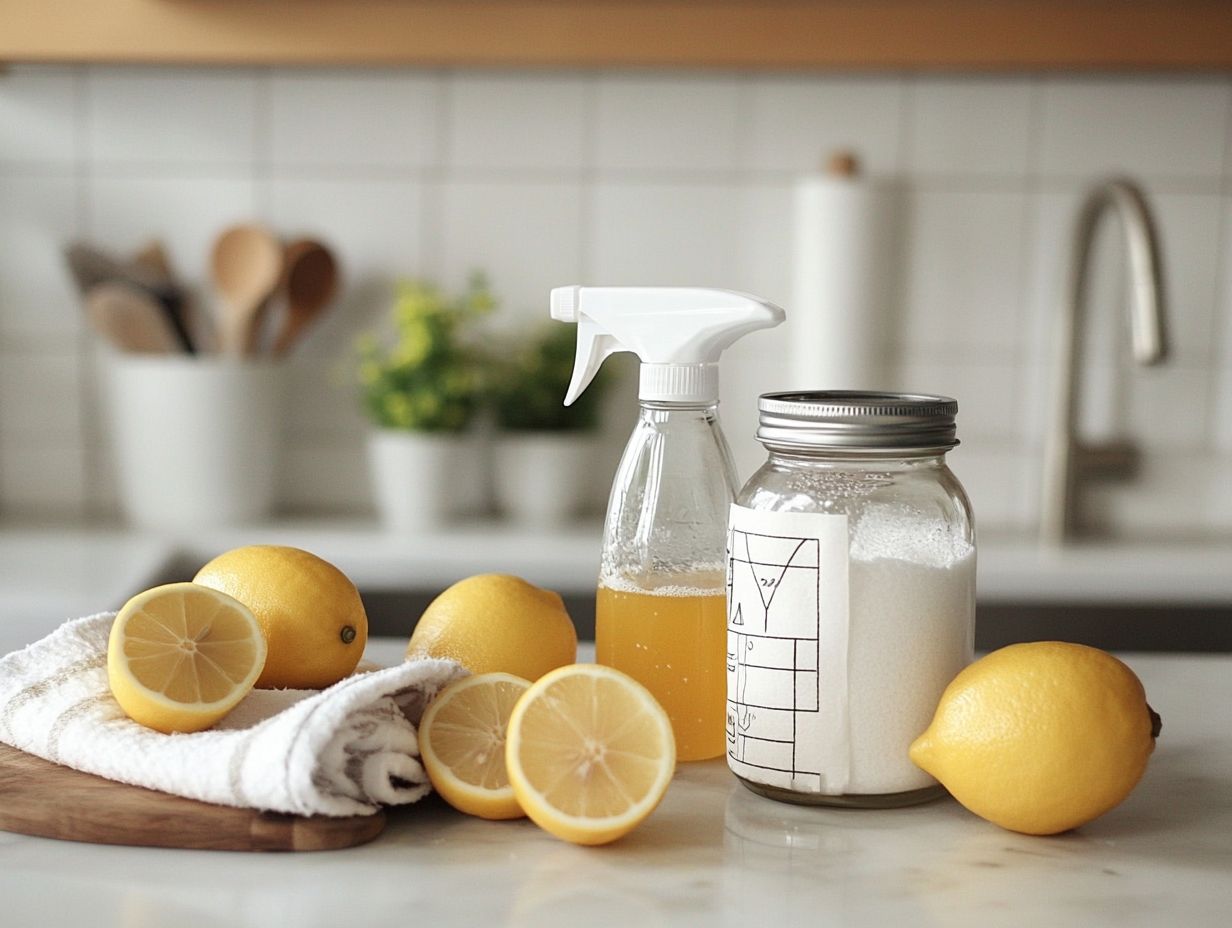
Choosing homemade cleaners allows you to create a non-toxic cleaning environment, protecting both your health and the safety of your pets from harmful chemical exposure. Many conventional cleaners contain hazardous ingredients that can lead to respiratory issues, skin irritations, and even long-term health effects.
In contrast, natural cleaning solutions made with baking soda, white vinegar, and essential oils offer a safe and effective alternative. By opting for non-toxic cleaners, you can maintain a spotless home while prioritizing your well-being.
Studies have revealed that exposure to toxic cleaning products can lead to a range of health problems. A 2018 study published in the American Journal of Respiratory and Critical Care Medicine found that women who frequently used cleaning sprays experienced a 30% decline in lung function over 20 years. This alarming statistic emphasizes the necessity of transitioning to non-toxic solutions.
Not only do homemade cleaners help you avoid harmful chemicals, but you can also enhance them with essential oils like tea tree and lavender. These oils possess natural antibacterial properties and leave behind delightful aromas, transforming your living space into a healthier and more pleasant environment.
4. Versatile
The versatility of homemade cleaners truly shines, allowing you to whip up various cleaning solutions tailored to different surfaces and challenges from multipurpose cleaners to targeted stain removers. You can even create specialized solutions, such as a toilet cleaner using baking soda and hydrogen peroxide.
By combining everyday household ingredients like baking soda, white vinegar, and hydrogen peroxide, you can create powerful solutions for kitchens, bathrooms, and even delicate fabrics such as carpets. This adaptability lets you customize your cleaning routine to suit your unique needs and preferences, resulting in a more efficient and personalized cleaning experience.
Exploring different concoctions for specialized tasks not only expands your cleaning arsenal but also adds a delightful touch of creativity to the chore. A simple mix of 1 part vinegar to 1 part water works wonders as a glass cleaner, leaving surfaces streak-free and sparkling. Similarly, a paste made from baking soda and water can tackle stubborn stains on your countertops and can even be used as a carpet cleaner.
If you re seeking a fresh scent, infusing your cleaners with essential oils can transform a mundane task into a sensory delight. By experimenting with ratios and ingredients, you can craft tailored solutions for everything from greasy ovens to dusty blinds, offering endless possibilities for effective and enjoyable cleaning. Resources like the Good Housekeeping Institute provide valuable DIY tips for ensuring your homemade cleaners work effectively.
How to Make Homemade Cleaners
Creating homemade cleaners is an easy task that lets you use the effectiveness of natural ingredients like baking soda, white vinegar, and essential oils. These homemade cleaning solutions can be as effective as commercial options.
This approach saves you money and ensures the cleaning products you use at home are safe and environmentally friendly.
1. Basic Ingredients
The essential ingredients for your homemade cleaners are:
- Baking soda
- White vinegar
- Essential oils
- Castile soap (a plant-based soap)
- Hydrogen peroxide
Baking soda acts as a gentle abrasive and deodorizer, while white vinegar is a natural disinfectant that cuts through grease and grime. Essential oils like lavender or tea tree oil not only add pleasant scents but also have antibacterial properties.
Castile soap is perfect for tackling dirt while being gentle on your skin, making it a great choice for allergy sufferers. Hydrogen peroxide serves as a powerful stain remover and disinfectant for sanitizing surfaces.
You can source these ingredients sustainably by buying in bulk or choosing brands that follow eco-friendly practices. Consider using homemade sprays stored in reusable containers like G dessert ramekins to reduce waste.
If you or someone in your home has sensitivities, consider alternatives like unscented soap or citrus peels to maintain effectiveness and comfort. This thoughtful cleaning approach fosters a healthier living environment and helps in the preservation of our planet. For more information on effective ingredients, check out reviews on Amazon.
2. Recipes for Different Surfaces
Homemade cleaning recipes can be tailored for specific surfaces, ensuring effective cleaning without damaging materials. You can create:
- A multipurpose cleaner
- A glass cleaner
- A toilet cleaner
For example, a simple glass cleaner can be made with equal parts water and white vinegar. Meanwhile, a toilet cleaner can be made using baking soda and essential oils for both cleaning power and a pleasant scent. Personalizing these recipes helps achieve optimal results.
Making your own cleaning solutions is fun and saves money. For gleaming hardwood floors, mix vinegar and olive oil for a nourishing shine. A paste of baking soda and water can tackle stubborn kitchen stains effortlessly. If you’re sensitive to scents, swap essential oils for citrus juice for a refreshing twist.
These DIY recipes encourage experimentation. Feel free to mix and adjust ingredients based on your unique cleaning needs and preferences. This approach leads to a greener and more personalized cleaning routine that reflects your lifestyle. As Amy Fort from the Good Housekeeping Institute suggests, homemade solutions can outshine store-bought ones in both cost and effectiveness.
Start making your own cleaners today and enjoy the benefits of a cleaner, safer home!
3. Tips for Making Homemade Cleaners
Creating effective homemade cleaners is all about embracing a few helpful DIY tips that guarantee optimal results and safe usage. It’s super important to understand proper storage and precise ingredient ratios. For example, when selecting essential oils, choose high-quality products and store your cleaners in dark glass bottles to preserve their potency.
Don’t hesitate to experiment with different ingredient ratios! This can lead you to more effective cleaning solutions that are perfectly tailored to specific tasks or surfaces.
Always label your cleaners right away to avoid mistakes! Include the date and main ingredients used to prevent any mix-ups. Always wear gloves when working with stronger solutions, and ensure your workspace is well-ventilated.
By following these practices and adjusting your recipes to fit your unique needs, you’ll create effective homemade cleaners while prioritizing safety and quality.
Are Homemade Cleaners Safe to Use?
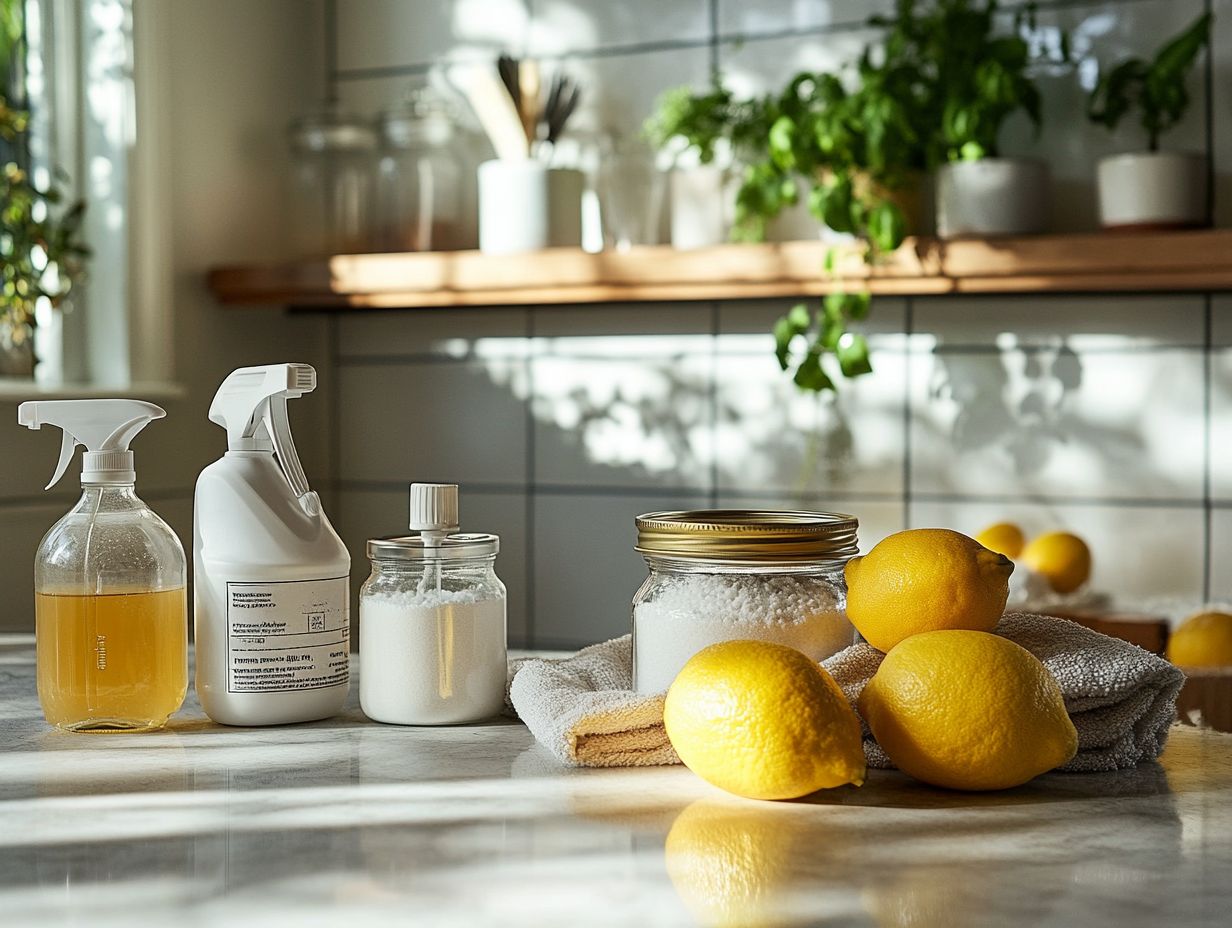
Homemade cleaners are often regarded as a safe choice thanks to their non-toxic ingredients. However, you must take certain precautions for safe usage and maximum effectiveness.
Understanding the properties of the ingredients you use such as the reactions between vinegar and hydrogen peroxide is crucial. This knowledge can prevent unintended consequences. By studying these components and adhering to basic safety practices, you can confidently integrate homemade cleaners into your cleaning routine, boosting both your home s environment and your cleaning experience.
1. Potential Risks of Homemade Cleaners
While homemade cleaners are generally safe and non-toxic, it s important to be aware of potential risks, especially when combining certain ingredients. For instance, never mix hydrogen peroxide and vinegar, as this can lead to the release of harmful gases.
Some people might have sensitivity to strong scents from essential oils, resulting in discomfort or allergic reactions. Being conscious of these risks is key to ensuring your homemade cleaning practices are both safe and effective.
To mitigate these risks, do your homework on the ingredients you plan to use. Ensure they are compatible and safe for use. For example, baking soda is a fantastic stain remover when used alone. However, combining it with vinegar can create a fizzy reaction, which might be messy and ineffective for cleaning.
Use essential oils with lower concentrations and perform a patch test on your skin to check for any adverse reactions.
Be mindful of signs of discomfort, such as headaches or skin irritation. This will empower you to adjust your formulations promptly, ensuring that your homemade cleaning experience is both pleasant and safe.
2. Precautions to Take When Using Homemade Cleaners
Taking the right precautions when using homemade cleaners is essential for both safety and effectiveness. Always label all your homemade cleaning solutions clearly to prevent accidental use or ingestion. Keep them out of reach of children and pets.
Before applying any homemade cleaner, always test a small, inconspicuous area first to confirm its compatibility with the surface you’re cleaning.
To enhance your safety, avoid mixing different homemade cleaners, as chemical reactions can produce harmful fumes. When handling stronger mixtures, wear gloves to protect your skin, and make sure the area is well-ventilated.
Store your cleaning solutions in securely sealed containers to maintain their potency and prevent spills. Regularly check the condition of your stored cleaners to ensure they remain effective and safe for future use.
Familiarizing yourself with the ingredients in these solutions is also recommended. Understanding their properties can lead to more effective and safe cleaning practices overall.
Start your journey to safer cleaning today by trying these tips!
Cost Comparison: Homemade Cleaners vs. Store-Bought Cleaners
When comparing homemade cleaners to store-bought alternatives, the cost difference is remarkably clear. Homemade solutions often deliver substantial savings while maintaining comparable effectiveness.
Many commercial cleaning products are priced not just for their convenience but also for their smart marketing. Homemade cleaners leverage affordable household ingredients like baking soda and white vinegar, making them a smarter, more economical choice.
By calculating the expenses associated with both options, you can clearly appreciate the value of choosing DIY cleaning solutions without compromising quality.
1. Initial Cost
The initial cost of homemade cleaning is significantly lower than that of store-bought alternatives. Most recipes rely on inexpensive household staples like baking soda, white vinegar, and water ingredients that you can often find in bulk or snag on sale.
In contrast, many commercial cleaning products come with hefty price tags, largely due to clever marketing, which means you end up paying for convenience rather than effectiveness. According to the Good Housekeeping Institute, homemade alternatives can often match or exceed the performance of commercial products.
This cost disparity makes homemade cleaners an enticing option for budget-conscious individuals. Popular resources like DIY tips can help you make these cleaners.
For example, a gallon of white vinegar generally costs around $3 and can tackle a variety of cleaning tasks, from disinfecting surfaces to deodorizing rooms. This makes it an incredibly economical choice.
On the other hand, a popular multipurpose cleaner might set you back over $5 for a much smaller quantity, lacking the same versatility. Purchasing baking soda in bulk can further cut down your cost per use, giving you a powerful agent for scrubbing and deodorizing.
A popular tip from Amy Fort , a renowned cleaning expert, is to use baking soda along with vinegar for a thorough clean. By investing in a few basic ingredients instead of a clutter of special-purpose cleaners, you save money and craft custom solutions that are safe for your family and the environment.
This ensures long-term benefits that really add up. You might even find creative ways to store your homemade cleaners, such as reusing G dessert ramekins for convenient and eco-friendly storage.
2. Long-Term Savings
Choosing homemade cleaners not only gives you immediate cost benefits but also leads to significant long-term savings. Many DIY tips available online can help you maximize these savings. These solutions can be crafted in large batches, tailored to your personal needs, and reduce the frequency of purchases.
Buying ingredients on platforms like Amazon can make this process even more convenient and cost-effective. Unlike store-bought cleaners that demand constant replenishment, the long-lasting ingredients in your homemade recipes offer greater flexibility and cost efficiency over time.
Every dollar you save with homemade cleaners can make a big difference in your budget! By opting for homemade alternatives, you might find yourself saving hundreds of dollars each year.
For instance, consider all-purpose cleaners that retail for about $5 per bottle. If you’re buying two bottles each month, that adds up to $120 annually. In contrast, the cost of creating a comparable homemade cleaner could drop to less than $30 a year.
Beyond finances, the sustainability aspect is equally compelling. By utilizing homemade products, you significantly reduce the single-use plastic waste typically associated with store-bought cleaners. This mindful approach not only protects the environment but also enhances the air quality in your living spaces.
This fosters a healthier and greener home for everyone. Start saving money on your cleaning supplies today!
In conclusion, the benefits of homemade cleaners are clear. They save you money, reduce waste, and offer safer alternatives for your home. Making the switch can lead to both financial and environmental rewards.
3. Effectiveness
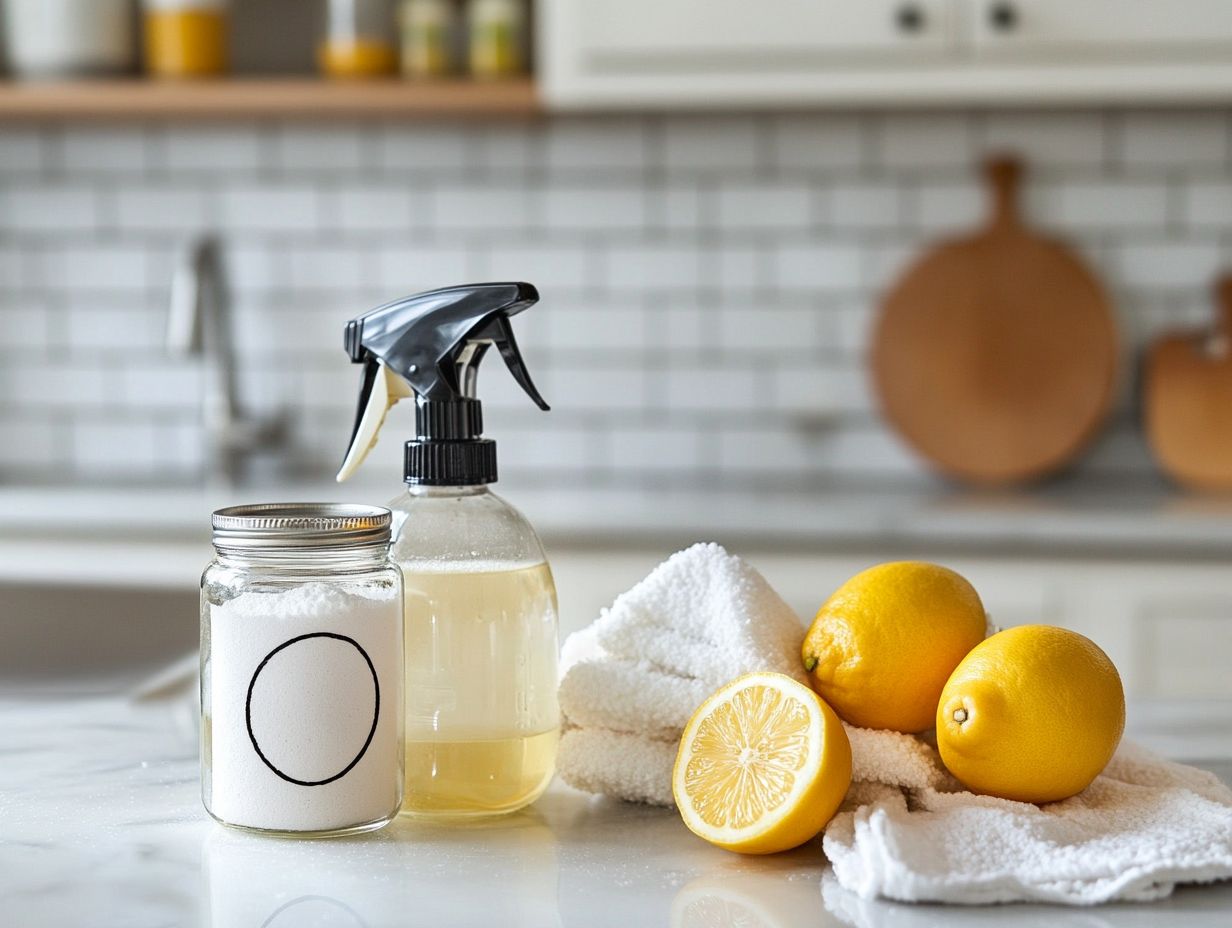
The effectiveness of homemade cleaners can often rival that of their store-bought counterparts. Many DIY recipes harness the power of natural ingredients to conquer tough stains and grime.
Take baking soda, for example. It serves as an excellent cleaner that scrubs tough stains, excelling at tackling stubborn bathroom soap scum and often outshining some commercial scrubbers. When paired with homemade soaps, it becomes even more effective. You may have heard about the miraculous results others have experienced when using a paste of baking soda and water. Not only does it lift stains, but it also leaves surfaces sparkling clean.
Then there’s lemon juice, renowned for its natural antibacterial properties. It can brighten surfaces and refresh laundry, making it a worthy alternative to traditional bleach. Join the countless satisfied users who have discovered the magic of homemade cleaners! Many have customized their cleaning solutions for specific tasks like using a concentrated vinegar solution for greasy kitchen surfaces to achieve impressive results while minimizing exposure to synthetic chemicals and reducing their environmental footprint.
For more tips on DIY cleaning, follow experts like Amy Fort or refer to resources from the Good Housekeeping Institute.
Frequently Asked Questions
Are Homemade Cleaners Cost-Effective?
Yes, homemade cleaners can be a cost-effective alternative to store-bought cleaners. Many DIY tips can help you maximize your homemade cleaners.
Why are homemade cleaners cheaper?
Homemade cleaners use common household ingredients, which are often much cheaper than store-bought cleaners.
Do homemade cleaners work as well as store-bought cleaners?
Yes, homemade cleaners can be just as effective as store-bought cleaners when properly made and used. Many users share tips from the Good Housekeeping Institute and experts like Amy Fort .
Are there any risks associated with using homemade cleaners?
As with any cleaner, certain ingredients can be harmful if not used properly. It is important to research and follow recipes carefully to ensure safety.
Can using homemade cleaners save me money in the long run?
Yes, using homemade cleaners can save money in the long run since the ingredients can be used for multiple cleaning solutions and often last longer than store-bought cleaners.
What are the benefits of homemade cleaners?
Experts say that homemade cleaners are often safer and better for the environment. They typically use natural, non-toxic ingredients, making them a safer and more eco-friendly option for cleaning.
Start your journey towards a cleaner home and a healthier planet by trying your hand at making homemade cleaners today!

